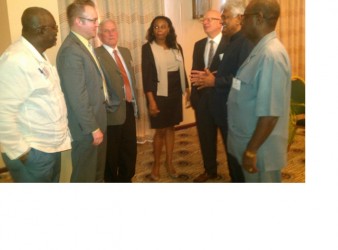The Guyana Elections Commission (Gecom) today announced that it is exploring the possibility of embarking on a pilot project in which automatic scanning and tabulation machines could be used in a future election.
A team of representatives of the DELIAN Project, an independent, non-profit organisation registered in North America, visited Guyana last week and conducted a demonstration on the use of automatic ballot scan and tabulation technology, Gecom disclosed today, while saying that a pilot project is being considered out of recognition “of the need to tabulate, certify and announce accurate results of elections in a timelier manner.”
At the demonstration that was held last week Monday, it was pointed out that the DELIAN Project could donate up to 25 paper-based automatic ballot scan and tabulation machines to Guyana for a future election, Gecom said in a statement today.
The automatic system could be deployed on a pilot basis at up to 25 polling stations at a future election, it said, while noting that each machine can handle roughly 1,000 to 1,250 voters on a typical polling day.
According to Gecom, the DELIAN Project, which was created in 2011 as a philanthropic entity by the Canadian elections technology firm Dominion Voting Systems, procures and donates electoral technology to emerging and growing democracies.
The commission noted that Guyana’s elections laws do not currently provide for the use of electronic voting systems and would need to be amended accordingly, should there be agreement between it and the bona fide political parties pertaining to any introduction of the automatic ballot scan and tabulation systems in Guyana.
Following the delay of the announcement of November 28, 2011 general elections results, Gecom Chairman Dr Steve Surujbally had announced that the commission would pursue an electronic-voting pilot project as part of preparations for local government polls. Those polls, however, have been repeatedly delayed since then while there has been no indication of progress on the front of an electronic voting project.

Gecom said that the automatic ballot scan and tabulation systems are paper-based and allow for electronic, automatic tabulation of results.
“They are a form of document ballot voting systems, meaning that there is a tangible record of the voter’s intent even as a voter still marks a traditional paper ballot,” it explained.
“The advantage of a paper-based, automatic ballot scan and tabulation system solution is that results are tabulated (counted) as they are sent in at the close of the polls, resulting in the ability to announce results immediately, while still maintaining the comfort of a “paper trail” should a physical re-count be required,” it added.
According to Gecom, the procedure for using the automatic ballot scan and tabulation system involves: “(i) the voter simply using pen and paper to mark his/her intent on the ballot, and (ii) the voter’s ballot paper being confidentially scanned and dropped into a sealed ballot box.” At the close of polls, it said, results are tabulated and the statement of poll is printed and shared with polling station officials, and then sent to the Returning Officer through a secure, electronic medium. It noted that in the case of an unclear mark, “the ballot scan and tabulation machine returns the ballot to the voter for review and correction, if desired.” Finally, it said, the Returning Officer electronically collates and tabulates poll results received from the multiple machines to rapidly and accurately produce consolidated poll results. “Of importance, it must be noted that the ballot paper can be used to complete an audit trail if a manual recount becomes necessary,” it added.
Gecom said that during its three-day visit to Guyana, the DELIAN Project representatives also met with the PPP/C, APNU and the AFC. They also visited Leguan and Wakenaam Islands to get a feel of the type of terrain in which the machines could be put to use in any pilot project.
The DELIAN team comprised Jean-Pierre Kingsley, Chairman of the DELIAN’s Advisory Board and who served as the Chief Electoral Officer of Canada from 1997 to 2010; John Hollins, Chairman of the DELIAN Board of Directors, who was Chief Electoral Officer for the Province of Ontario from 2001 to 2008; and Allan Best, Managing Director.

